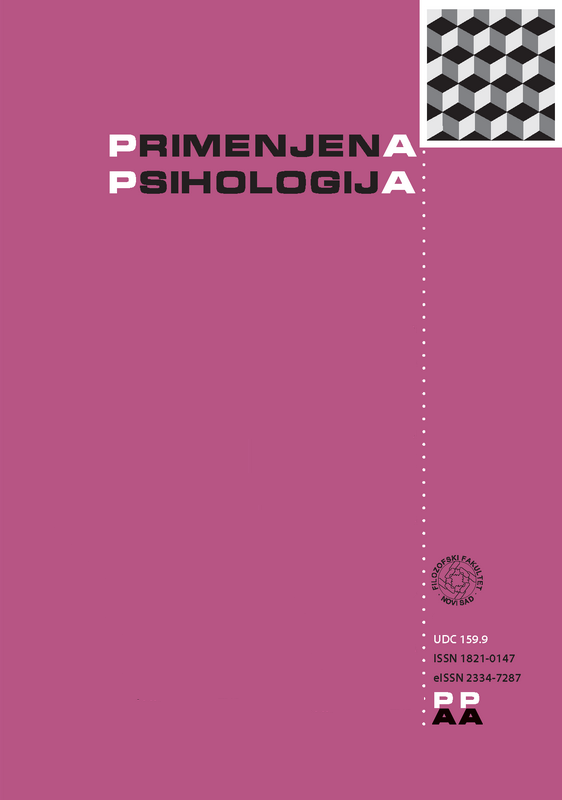SOCIAL IDENTITY COMPLEXITY AND INCLUSIVENESS AS PREDICTORS OF INTERGROUP EMOTIONS
DOI:
https://doi.org/10.19090/pp.2015.4.363-378Keywords:
social identity complexity, social identity inclusiveness, religion, ethnicity, intergroup emotionsAbstract
As we belong to a host of groups, we have a multitude of social identities that are interdependent. Social identity complexity refers to the degree of overlap between cross-cutting group memberships while social identity inclusiveness to the range of people a person identifies with through shared group membership. In this paper, we explored the relationship between the complexity and inclusiveness of social identity, and feelings toward ethnic/religious in-groups, as well as feelings toward out-group members. The research was conducted in two cities in Serbia: Belgrade and Novi Pazar (N = 178; average age 23), allowing for comparisons between young Serbs and Bosniaks, who belonged to the groups with a recent history of conflict. We found that social identity complexity was unrelated, whilst social identity inclusiveness was systematically and positively related to more positive feelings toward religious and ethnic out-groups. This effect was significant across different ethnic groups (Serbs and Bosniaks) and local contexts (Belgrade and Novi Pazar). Both social identity complexity and inclusiveness were unrelated to emotions toward members of the own group. We related these results with the existing data on the social identity structure and intergroup relations, and discussed the importance of inclusive identities for building tolerant societies.
Metrics
References
Bodenhausen, G. V. (2010). Diversity in the person, diversity in the group: challenges of identity complexity for social perception and social interaction. European Journal of Social Psychology, 40, 1‒16. doi: 10.1002/ejsp.647
Brewer, M. B., & Pierce, K. P. (2005). Social identity complexity and out-group tolerance. Personality and Social Psychology Bulletin, 31, 428‒437. doi: 10.1177/1368430208098778
Brewer, M. B., Gonsalkorale, K., & van Dommelen, A. (2013). Social identity complexity: comparing majority and minority ethnic group members in a multicultural society. Group Processes & Intergroup Relations, 16, 529‒544. doi: 10.1177/1368430212468622
Converse, J. M., & Presser, S. (1986). Survey questions: Handcrafting the standardized questionnaire (Vol. 63). London: Sage.
Laurence, J. (2015). When numbers count: Community ethnic composition, prejudice, and the moderating role of inter-ethnic segregation for the contact and threat hypotheses. Paper presented at International migration, integration and social cohesion annual conference, Geneva, Switzerland.
Mackie, D. M., Devos, T., & Smith, E. R. (2000). Intergroup emotions: Explaining offensive action tendencies in an intergroup context. Journal of Personality and Social Psychology, 79, 602–616. doi: 10.10371/0022-3514.79.4.602
Mackie, D. M., Smith, E. R., & Ray, D. G. (2008). Intergroup emotions and intergroup relations. Social and Personality Psychology Compass, 2, 1866‒1880. doi: 10.1111/j.1751-9004.2008.00130.x
Maloku-Bërdyna, E. (2012). Building a Kosovar identity: How intergroup contact affects social identity complexity and intergroup relations. Unpublished manuscript.
Miller, K. P., Brewer, M. B., & Arbuckle, N. L. (2009). Social identity complexity: Its correlates and antecedents. Group Processes & Intergroup Relations, 12, 79‒94. doi: 10.1177/1368430208098778
Milošević-Đorđević, J. (2007). Primordialistic concept of national identity in Serbia. Psihologija, 40, 385‒397. doi:10.2298/PSI0703385M
Pratto, F., Korchmaros, J., & Hegarty, P. (2007). When race and gender go without saying. Social Cognition, 25, 241‒247. doi: 10.1521/soco.2007.25.2.221
Pratto, F., Sidanius, J., & Levin, S. (2006). Social dominance theory and the dynamics of intergroup relations: Taking stock and looking forward. European Review of Social Psychology, 17, 271‒320. doi:10.1080/10463280601055772
Roccas, S., & Brewer, M. B. (2002). Social identity complexity. Personality and Social Psychology Review, 6, 88‒106. doi: 10.1207/S15327957PSPR0602_01
Schmid, K., Hewstone, M., Tausch, N., Cairns, E., & Hughes, J. (2009). Antecedents and consequences of social identity complexity: Intergroup contact, distinctiveness threat, and outgroup attitudes. Personality and Social Psychology Bulletin, 35, 1085‒1098. doi: 10.1177/0146167209337037
Sidanius, J., & Pratto, F. (1999). Social dominance: An intergroup theory of social hierarchy and oppression. New York: Cambridge University Press.
Tajfel, H., & Turner, J. C. (1986). The social identity theory of inter-group behavior. In S. Worchel & L. W. Austin (Eds.), Psychology of Intergroup Relations (pp. 7‒24). Chicago: Nelson-Hall.
Turjačanin, V., & Majstorović, D. (2013). Construction of ethnic and state identity among youth in postwar Bosnia-Herzegovina. In C. Gordon, M. Kmezic, & J. Opardija (Eds.), Stagnation and Drift in the Western Balkans (pp. 217–244). Bern: Peter Lang.
van Dommelen, A. (2011). The role of social identity inclusiveness and structure in intergroup relations. Paper presented at the Annual Meeting of International Society of Political Psychology, Istanbul, Turkey.
van Dommelen, A. (2014). The role of social identity inclusiveness and structure in intergroup relations (Unpublished PhD thesis). University of Sydney, Australia.
van Dommelen, A., Schmid, K., Hewstone, M., Gonsalkorale, K., & Brewer, M. (2015). Construing multiple in-groups: Assessing social identity inclusiveness and structure in ethnic and religious minority group members. European Journal of Social Psychology, 45, 386‒399. doi: 10.1002/ejsp.2095
Verkuyten, M., & Martinovic, B. (2012). Social identity complexity and immigrants’ attitude toward the host nation: The intersection of ethnic and religious group identification. Personality and Social Psychology Bulletin, 38, 1165‒1177. doi: 10.1177/0146167212446164







